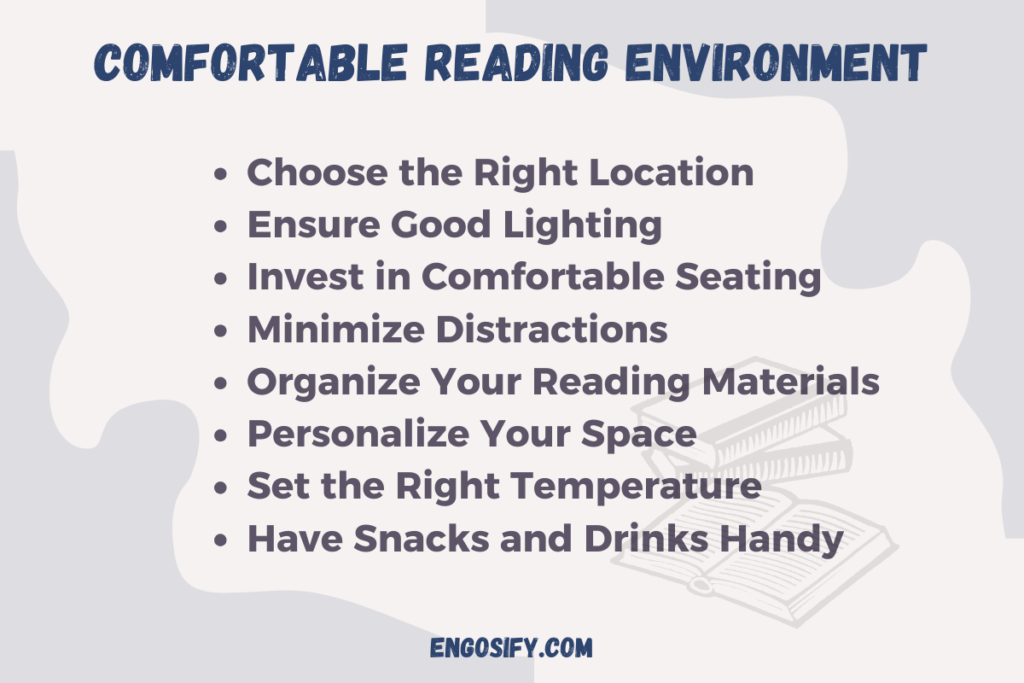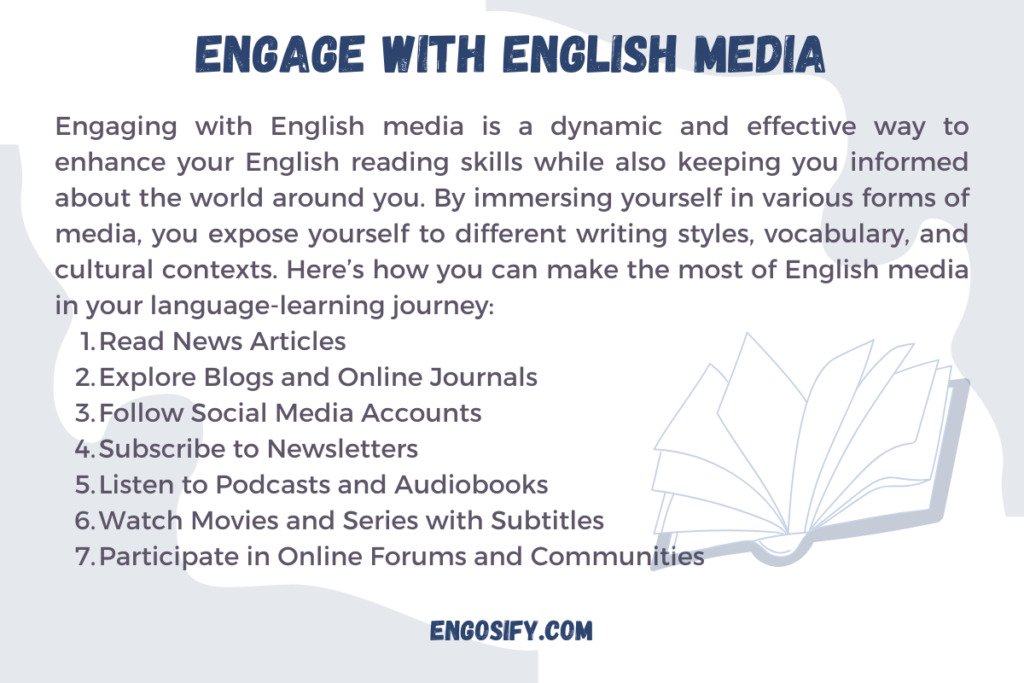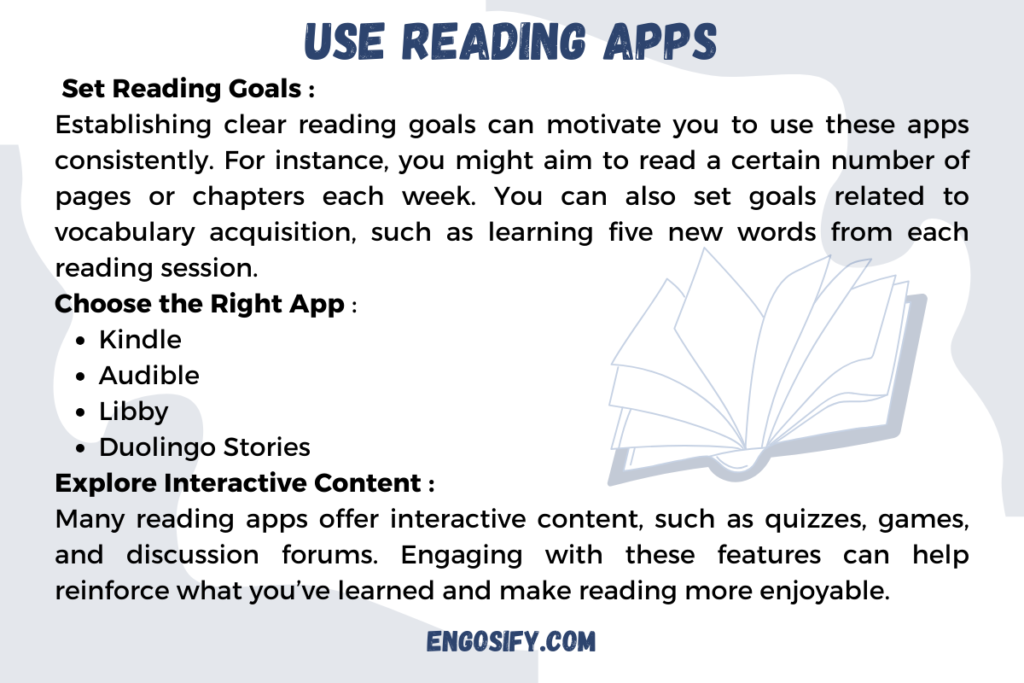Improve English reading skills can feel like a daunting task, but it doesn’t have to be! Whether you’re a beginner or looking to sharpen your existing skills, establishing a consistent reading habit can dramatically enhance your proficiency. This article will explore ten practical tips to help you improve your reading skills every day. Each tip is designed to be engaging and easy to incorporate into your daily routine. Let’s dive into the first part and discover how you can set yourself up for reading success!
Establish a Consistent Reading Routine
Set Aside Dedicated Time for Reading
One of the best ways to enhance your English reading skills is by carving out specific time for it in your daily routine. Just like any other habit, consistency is key. If you dedicate even just 15–30 minutes each day to reading, you’ll be amazed at how quickly you progress!
Start by finding a time that works for you. Maybe it’s in the morning with your coffee, during your lunch break, or right before bed. The important thing is to stick with it. By making reading a regular part of your day, you’re not just improving your skills; you’re also building a healthy habit that can enrich your life. Over time, this daily commitment will pay off, and you’ll notice a boost in both your vocabulary and comprehension.
Create a Comfortable Reading Environment
Let’s face it: if you’re not comfortable, you’re less likely to focus. So, create a reading nook that feels inviting. It could be a cozy chair with a good lamp, or even a spot on your bed. The goal is to make your reading time something you look forward to.
Think about minimizing distractions too. Put away your phone or turn off the TV—these interruptions can pull you out of your reading zone. A peaceful environment will not only help you concentrate better but also allow you to enjoy your reading experience more. In fact, studies show that a calm setting can significantly improve comprehension and retention of what you read.
As you settle into your reading routine, remember to choose materials that resonate with you, whether that’s novels, articles, or even short stories. The more you enjoy what you read, the more likely you are to stick with your new habit.

Choose Appropriate Reading Materials
Start with Simple English Books
Choosing the right reading materials is crucial for improving your English reading skills. Starting with simple English books is a fantastic way to build your confidence. Look for stories that are easy to understand, perhaps children’s books or graded readers designed for language learners. These types of books often use straightforward vocabulary and sentence structures, making them less intimidating.
As you dive into these simple texts, focus on enjoying the story rather than stressing about every single word. This approach not only makes reading more enjoyable but also helps you absorb the language naturally. You’ll find that as you become more comfortable, you’ll start to recognize patterns and phrases that frequently appear in English.
Gradually Increase Difficulty
Once you feel more confident with simpler materials, it’s time to challenge yourself. Gradually increasing the difficulty of your reading selections can significantly enhance your skills. Move on to books that have slightly more complex language or themes. Perhaps consider young adult fiction or popular novels that you’ve always wanted to read.
However, don’t just jump to the classics right away. It’s important to find a balance between challenging yourself and still enjoying the reading experience. Look for books that pique your interest and encourage exploration of new vocabulary. As you encounter new words, take a moment to look them up and jot them down. This practice will help you expand your vocabulary while still enjoying a good story.
By slowly increasing the difficulty of your reading materials, you’ll enhance your comprehension and gain a deeper understanding of sentence structures and idiomatic expressions. Plus, you might discover new genres and authors that you love!
To further support your reading journey, check out BBC Learning English: Vocabulary Building for excellent resources on expanding your vocabulary as you read.
Utilize Bilingual and Learning Books
Incorporate Bilingual Texts
One of the most effective strategies for improving your English reading skills is to incorporate bilingual texts into your practice. These books present the same content in both your native language and English, allowing you to easily reference the translations as you read. This can be particularly helpful if you come across words or phrases that seem confusing.
When using bilingual texts, try reading a paragraph in English first, and then check the translation. This technique not only helps you understand the context but also reinforces your vocabulary as you see the same ideas expressed in different languages. It’s like having a personal tutor guiding you through the intricacies of English!
Additionally, bilingual books often cover a wide range of topics, from fiction to nonfiction, giving you the flexibility to choose materials that genuinely interest you. This personal connection to the content will keep you motivated and engaged as you learn.
Explore Learning Books Designed for English Learners
In addition to bilingual texts, there are many learning books specifically designed for English learners. These resources often include vocabulary lists, comprehension questions, and exercises that can help reinforce what you’ve read. They’re great for both self-study and guided learning, making them versatile tools for language improvement.
Consider picking up a few graded readers or books from series aimed at English learners. These texts are structured to gradually increase in difficulty, helping you build your skills without feeling overwhelmed. The included exercises can also provide valuable practice in applying what you’ve learned, further solidifying your understanding of the language.
Moreover, many of these learning books come with audio options, allowing you to listen to the text as you read along. This dual approach enhances your comprehension and pronunciation, as you hear how words and phrases are naturally spoken.
For more guidance on improving your reading skills, check out Reading Rockets: Strategies for Reading Comprehension. This resource offers a wealth of strategies and tips that can complement your reading practice effectively.
Integrate Reading into Daily Life
Read English Signs and Labels
One of the simplest yet most effective ways to improve your English reading skills is to engage with the text all around you. Start by paying attention to English signs and labels in your environment. Whether you’re out shopping, commuting, or just walking around, take the time to read anything you come across—store signs, public notices, and even product labels.
This everyday reading practice helps you familiarize yourself with practical vocabulary and common phrases used in daily life. You’ll start to notice patterns in the language and gain confidence in your ability to read and understand real-world English. Plus, it’s a great way to stay connected to your surroundings, making the experience more enjoyable and relevant.
Engage with English Media
Another excellent way to integrate reading into your daily life is by exploring English media. This can include newspapers, magazines, blogs, and online articles. Not only will this expose you to a variety of writing styles and topics, but it will also help you stay informed about current events, which can be a great conversation starter.
When selecting articles to read, try to choose topics that genuinely interest you. This will make your reading sessions more enjoyable and motivate you to keep going. Additionally, you can mix in different formats, such as opinion pieces, reviews, and even fiction, to expand your vocabulary and comprehension further.
Moreover, consider subscribing to English-language newsletters or following blogs that cover subjects you love. This approach ensures that you receive regular doses of reading material, keeping your skills sharp and your knowledge up-to-date.
To enhance your reading experience, check out Cambridge English: Reading Skills for tips and resources specifically tailored to improve your reading abilities. This site provides a wealth of information that can complement your everyday reading practices.

Expand Your Vocabulary
Learn New Words Daily
Expanding your vocabulary is a vital aspect of improving your English reading skills. One effective way to do this is by committing to learning a few new words every day. Set a realistic goal—maybe three to five words that you want to focus on. This can be from your reading materials or even from conversations you overhear or participate in.
To make this process enjoyable, try to choose words that intrigue you. Look for terms that relate to topics you’re passionate about or ones that you encounter frequently. Write these words down, along with their meanings and example sentences. By doing this, you’re not just memorizing definitions; you’re also learning how to use them in context, which is key to retention.
Use Flashcards for Vocabulary Building
A fantastic tool for reinforcing new vocabulary is the use of flashcards. This method can be both fun and effective, allowing you to test yourself regularly. You can create physical flashcards or use various apps designed for vocabulary learning, such as Anki or Quizlet.
On each flashcard, write the new word on one side and its definition, synonyms, or an example sentence on the other. Spend a few minutes each day reviewing your flashcards. This repetition will help solidify your understanding and make it easier to recall these words when you encounter them in your reading.
Additionally, try to incorporate these new words into your everyday conversations or writing. The more you use them, the more familiar they will become. This practice not only boosts your vocabulary but also helps to make your reading experience richer and more enjoyable.
For effective strategies on building your vocabulary, don’t forget to visit BBC Learning English: Vocabulary Building. This resource is packed with tips and exercises that can support your vocabulary enhancement efforts.
Practice Active Reading Techniques
Highlight Key Points
When it comes to improving your English reading skills, practicing active reading techniques can significantly boost your comprehension. One effective method is to highlight key points as you read. This doesn’t just mean underlining or marking sentences at random; instead, focus on the main ideas, important details, and any unfamiliar vocabulary that stands out to you.
By actively engaging with the text in this way, you’re training your brain to identify what’s essential. It’s like having a conversation with the material rather than passively absorbing information. After highlighting, take a moment to review what you’ve marked. Ask yourself why these points are significant and how they connect to the overall message of the text. This practice can deepen your understanding and make the material more memorable.
Summarize After Reading
Another powerful technique is to summarize the content after you’ve finished reading. This could be done verbally or in writing, but the key is to distill what you’ve just learned into a concise recap. Try to answer questions like: What were the main points? What new information did I learn? How does this relate to what I already know?
Summarizing helps reinforce your comprehension and allows you to reflect on the material. It also highlights areas where you might need further clarification. If you find certain concepts tricky, don’t hesitate to revisit those sections or look for additional resources to help clarify them.
Additionally, consider sharing your summaries with a friend or in a reading group. This not only reinforces your understanding but also encourages discussion and can introduce you to new perspectives and insights.
To learn more about effective reading strategies, check out Reading Rockets: Strategies for Reading Comprehension. This resource offers valuable techniques that can complement your active reading practices.
Join Reading Groups or Clubs
Participate in Discussions
Joining reading groups or clubs can be a fantastic way to enhance your English reading skills while also connecting with others who share your interests. These groups provide a supportive environment where you can discuss books, exchange ideas, and gain different perspectives on the material you’ve read. Participating in discussions not only boosts your comprehension but also allows you to articulate your thoughts and opinions in English, which is invaluable for language learning.
When you discuss a book with others, you may discover themes or insights that you hadn’t noticed before. Hearing different viewpoints can deepen your understanding of the text and expand your vocabulary, as others may use words or phrases you’re not familiar with. This collaborative learning environment is beneficial because it encourages you to think critically and engage actively with the material.
Receive Constructive Feedback
Another significant advantage of joining a reading group is the opportunity to receive constructive feedback. Whether it’s about your understanding of a text or how you express your ideas during discussions, feedback from peers can help you identify areas for improvement. Perhaps a group member offers a different interpretation of a passage that prompts you to reconsider your own understanding.
Additionally, engaging with others in conversations about reading helps you practice your spoken English skills. You’ll become more comfortable expressing yourself and may even pick up new conversational techniques along the way. This social aspect of reading not only makes the process more enjoyable but also motivates you to keep reading and participating.
Consider searching for local reading groups at libraries, bookstores, or community centers. Alternatively, online platforms like Goodreads and Meetup offer virtual reading communities where you can join discussions from the comfort of your home.
For ideas on how to join or start a reading group, explore Reading Rockets: Strategies for Reading Comprehension. This site can provide you with useful tips to make the most of your reading discussions.
Leverage Technology and Online Resources
Use Reading Apps
In our digital age, technology offers a wealth of opportunities to enhance your English reading skills. One of the best ways to do this is by using reading apps. There are numerous applications available that cater specifically to language learners. These apps often provide features such as adjustable reading levels, built-in dictionaries, and interactive quizzes to reinforce what you’ve learned.
For example, apps like Kindle allow you to highlight text, look up definitions instantly, and even listen to audiobooks, making reading a more dynamic experience. Moreover, you can find many books and articles tailored to various reading levels, so you can choose material that suits your current skills while gradually challenging yourself.
Additionally, consider using apps like Duolingo or HelloTalk, which offer vocabulary-building exercises and the opportunity to interact with native speakers. These tools not only support your reading practice but also help improve your overall language proficiency.

Explore Online Reading Platforms
Online reading platforms are another excellent resource for enhancing your reading experience. Websites like Project Gutenberg provide access to thousands of free eBooks, including classic literature and contemporary works. This resource is especially beneficial for learners since you can explore a variety of genres and styles without financial commitment.
Furthermore, many online news websites and blogs offer articles tailored for English learners. For instance, Breaking News English provides simplified news articles with accompanying exercises that focus on vocabulary and comprehension. Engaging with these resources allows you to stay updated on current events while practicing your reading skills.
Lastly, consider following educational channels on platforms like YouTube. There are many content creators dedicated to teaching English who provide videos on reading strategies, book reviews, and discussions about various literary themes. Engaging with these multimedia resources can make your learning experience more enjoyable and interactive.
To discover a variety of free reading materials and resources, visit Project Gutenberg. This platform offers a treasure trove of books that can help you practice your English reading skills at no cost.
FAQs
What are some effective ways to improve my English reading skills?
To enhance your English reading skills, consider establishing a consistent reading routine, choosing appropriate materials, utilizing bilingual and learning books, and actively engaging with texts through summarization and discussions. Additionally, expand your vocabulary daily and leverage technology, such as reading apps and online resources, to make learning enjoyable.
How can I stay motivated to read regularly?
Staying motivated can be achieved by setting specific reading goals, exploring topics that interest you, and joining reading groups where you can share insights with others. Creating a cozy reading environment and rewarding yourself for reaching milestones can also help maintain your enthusiasm for reading.
How do I choose the right reading materials for my level?
Start with simple texts like children’s books or graded readers designed for language learners. As you gain confidence, gradually increase the complexity of your reading materials by exploring young adult fiction or popular novels. Choose topics that genuinely interest you to make the reading experience more enjoyable.
What are some active reading techniques I can practice?
Active reading techniques include highlighting key points, taking notes, and summarizing content after reading. Engaging with the text by asking questions and reflecting on the material can also enhance your understanding and retention.
Conclusion
Improving your English reading skills is a rewarding journey that not only enhances your language proficiency but also opens up a world of knowledge, culture, and enjoyment. Throughout this article, we’ve explored a variety of effective strategies to help you develop and refine your reading abilities every day. From establishing a consistent reading routine and selecting appropriate materials to expanding your vocabulary and practicing active reading techniques, each step you take brings you closer to becoming a more confident and proficient reader.
Remember, the key to success lies in making reading an integral part of your daily life. Whether you’re diving into a gripping novel, participating in a reading group, or utilizing technology and online resources, every bit of practice counts. Embrace the process, stay curious, and don’t hesitate to explore new genres and topics that pique your interest.
As you navigate this journey, be patient with yourself and celebrate your progress, no matter how small. The world of English reading is vast and full of opportunities for growth and discovery. So pick up a book, engage with the text, and enjoy every moment of your reading adventure. Happy reading!

